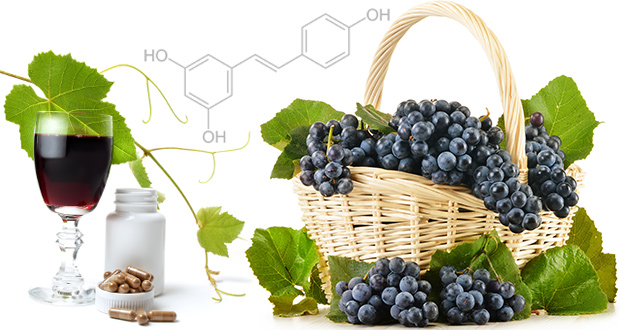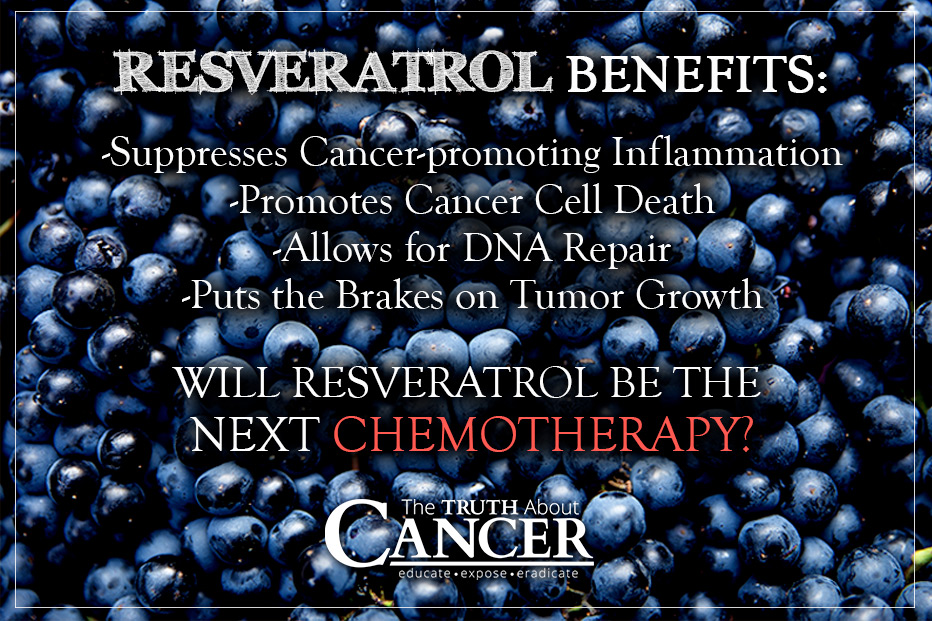Resveratrol is a powerful nutrient most known for its presence in grape skins. This micronutrient provides the human body with tools to prevent degenerative diseases and metabolic conditions − including cancer. The health benefits gained from resveratrol supplementation continue to amaze researchers as they seek to understand the critical role it plays, primarily in mitochondrial performance as well as genetic influences.
What is Resveratrol?
Researchers have been intrigued for years about what has been traditionally called the French paradox. This refers to the idea that the French seem to be able to eat cheese, smoke cigarettes, and drink lots of alcohol − and still maintain good health. Researchers have spotlighted the dark, fermented wines these individuals drink on a regular basis.
This caused researchers to dig deeper into understanding the fermented wines the French consume. What they found is that the active compound in red wine, resveratrol, has extraordinary health benefits.
Resveratrol is a powerful antioxidant classified as a polyphenol, and is the primary active compound associated with anti-aging. Polyphenols are a type of micronutrient known to help prevent illnesses such as cardiovascular disease and cancers such as colorectal cancer. The compound, also found in a variety of seeds and berries, is synthesized in plants to help protect against physical harm, infection, and disease. Interestingly, it helps to protect us as well!
6 Ways Resveratrol Supplements Benefit Your Health
-
Resveratrol Has Genetic Influences
Resveratrol influences gene expression and has shown to provide anti-aging benefits. Mitochondrial oxidative stress and consequential free radical reactions contribute to the advanced aging of cells. Conversely, longevity is associated with resistance to oxidative stress.
Some of these benefits are comparable to caloric restriction, which is known to increase life span. But most people will avoid caloric restriction from such strategies as fasting if they are provided with an alternative way to achieve the same effects. Similar to the protective effects of calorie restriction, resveratrol is thought to offer the anti-aging protection of mitochondria. The anti-aging benefits of resveratrol can be obtained through diet and supplements.
Resveratrol is able to put a temporary hold on the cell cycle by pausing at a stage which allows for DNA repair. As a consequence, a greater number of damaged genes are fixed and fewer mistakes continue to replicate in our cells.
Research from 2003 at Harvard University provided support that cells live longer with resveratrol. The study showed that yeast cells increased in longevity by as much as 70%. Further testing on roundworms and fruit flies yielded similar results. This made resveratrol the first compound to have anti-aging benefits amongst different species. An Italian scientist later researched the effect of resveratrol supplementation on fish in 2006 and found an increased longevity by more than 50%.
-
Resveratrol Stimulates Mitochondrial Activity
Mitochondria are known as cellular “powerhouses” because they generate the power needed to fuel every day metabolic functions within our cells and our entire body. The ability of resveratrol to reduce inflammatory stress on mitochondria has a huge impact on whole-body health. Healthy mitochondria are significantly more efficient and produce fewer free radicals than older mitochondria.
For instance, cancer cells are known to have dysfunctional mitochondrial function. While normal cells derive energy from oxidative phosphorylation, cancer cells cannot. Cancer cells must rely on anaerobic glycolysis for energy production. Addressing the mitochondria which drives the energy production of the cell is key to halt tumor growth and encourage cancer cell death.
-
Resveratrol Stabilizes Blood Sugar
Resveratrol has been shown to activate a group of mitochondrial proteins in the sirtuin family, and in particular (SIRT1). Several studies have shown that this sirtuin activation results in an increased level of mitochondria in the body. This plays a big role in energy production, fat and sugar metabolism, and blood sugar stability. With improved blood sugar the body is better able to regulate insulin and other hormones which reduces inflammation and improves fat burning.
-
Resveratrol Decreases Systemic Inflammation
Resveratrol lowers systemic inflammation by helping to regulate the nitric oxide cycle. The nitric oxide cycle is responsible for maintaining the health of the immune, nervous, and vascular systems through chemical signaling.
Present in three different forms, nitric oxide is found in our bodies as eNOS (iendothelial nitric oxide), iNOS (inducible nitric oxide) and nNOS (neuronal nitric oxide). Both eNOS and nNOS activity helps regulate the health of the brain and cardiovascular system while also ensuring suppressed iNOS levels. This healthy signaling pathway allows for proper blood flow to the brain through arteries and blood vessels.
However, chronic inflammatory stress increases iNOS signaling and counteracts the activity of eNOS and nNOS signaling. This improper cycle pattern can lead to hypertension, cardiovascular concerns, and neurodegenerative diseases.
Resveratrol impacts this system by inhibiting damage caused by stress, and promotes a normal and healthy nitric oxide cycle. Resveratrol results in improved endothelial performance and blood flow. Resveratrol is linked to the anti-inflammatory benefits associated with reduced risk of heart disease and neurodegenerative diseases such as Alzheimer’s and Parkinson’s disease.
-
Resveratrol Promotes Cell Death in Cancer Cells
Resveratrol has been shown to suppress nuclear factor Kappa Beta (NF-KB). NF-KB is a master inflammation causing agent that promotes cancerous growth in tissue.
Resveratrol acts on NF-KB by inhibiting its activity as well as allowing for the normal processes of the immune system to trigger cell cell death (apoptosis). The effects of resveratrol to promote apoptosis in cancer cells is so effective that researchers are analyzing the role it may play as a chemotherapeutic agent.
-
Resveratrol Suppresses Cancer Pathways
Another cell signaling pathway has been implicated in activating cancer growth in the breasts. Abnormal HRB-beta 1 (Heregulin-Beta1) can activate the matrix metalloproteinase (MMP) 9 enzyme and trigger invasive tumor growth.
Resveratrol has been shown to stop this pathway and prevent breast cancer. Evidence from other studies provides support that it may also be linked to the prevention of cancerous pathways in pancreas, skin, liver, colon, prostate, and many other cancer types.
Consider Resveratrol Supplementation
Many people think they can get enough resveratrol from drinking wine or eating grapes. Although these do have small amounts, it is not even close to the amount needed to achieve the clinically studied levels.
It would take 41 glasses of red wine in order to get up to the 20 mg minimum dosages that is clinically effective. That is obviously not feasible or healthy!
Healthy individuals might consider taking a daily resveratrol supplement ranging from 20 to 100 mg. Cancer patients may seek additional dosing amounts ranging from 100 to 200 mg.
Want to be notified when other awesome interviews or articles are added? Click here for our free weekly digest. You’ll be glad you did.
Article Summary
Resveratrol is a powerful nutrient most known for its presence in grape skins. It is a powerful antioxidant classified as a polyphenol, and is the primary active compound associated with anti-aging.
The compound, also found in a variety of seeds and berries, is synthesized in plants to help protect against physical harm, infection, and disease. It also helps to protect us!
Here are 6 ways that resveratrol may help to prevent cancer:
- Resveratrol influences gene expression and has shown to provide anti-aging benefits
- It stimulates mitochondrial activity and reduces inflammatory stress on mitochondria
- It helps to stabilize blood sugar
- It decreases systemic inflammation
- Promotes cell death in cancer cells
- It has been shown to suppress cancer cell pathways
It is not possible to receive clinical dosages of resveratrol from drinking wine or eating grapes. For example, it would take 41 glasses of red wine per day in order to get up to the 20 mg minimum dosage.
Healthy individuals might consider taking a daily resveratrol supplement ranging from 20 to 100 mg. Cancer patients may seek additional dosing amounts ranging from 100 to 200 mg.





















Peanuts and mulberries also have resveratrol, but make sure the peanuts are fresh. Old peanuts can have aflatoxin, a fungus that can make you sick. I buy the peanut butter that is just fresh peanuts that you can see in the transparent container, then I grind them immediately in the store and take them home. That way, they don’t have sugar, etc in them either. Most people can grow mulberries in the US, but you have to check which kind grows well in your region.
John
This is an excellent article, Dr. Jockers! What other foods besides grapes, peanuts, and mulberries consist of resveratrol? What stores in Canada can you purchase resveratrol supplements?
Excellent article, what stores in Georgia US can you purchase resveratrol supplements?
Erika , You can watch the supplements on the following web-site :-
youtube.com/watch?v=0HbEFLJ4ToY&nohtml5=False
youtube.com/watch?v=qNanExS_bos&nohtml5=False
This is in the liquid form which makes it easier to absorb directly into the body and you can order it directly via the internet via the web-site below just for your info.
Re: the French paradox. Could it also be that the French are likely eating high quality, raw, traditional cheeses rather than the American standard processed Velveeta cheese-food?
Another excellent source of resveratrol which is rarely discussed is japanese knotweed root (polygonum cuspidatum).
A tincture made from this, taken at teaspoon/5ml doses can supply up to 250mgs of resveratrol!
Higher than grapes/grapeskins etc.
We are all told that this “invasive weed” must be eradicated but have you ever wondered just how and why it is able to grow on impoverished soils and yet contain many therapeutic principles, not only resveratrol? It is also an amazing herbal medicinal plant to combat various viruses, bacteria and fungal infections.
I strongly recommend looking out for this as a natural and safe medicine rather than relying on supplements and “standardised” extracts etc. In nature nothing is standardised and medicinal plants adapt to their environments chemically to provide nutrients and phytochemicals to best serve human health and the health of our beautiful planet.
How many grapes or fresh homemade grape juice would approximate the amount that we need?
Please where can l buy organic Resveratrol Supplements.Until then l ‘m having fresh.organic wild blueberries , pure dark cocoa powder and dark chocolate.
U can get polyphenols supplements from Shaklee named Vivix. Contains not only resveratrol but more than 15 types of polyphenols